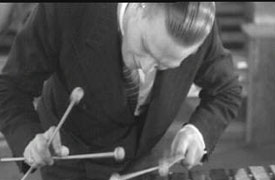 Jack Simpson, who generally played with Ambrose's Band, was an all-round percussionist who exhibits some of his skills in the self-titled Jack Simpson (1936).
Jack Simpson, who generally played with Ambrose's Band, was an all-round percussionist who exhibits some of his skills in the self-titled Jack Simpson (1936).
He starts off on a drum set but soon moves to a xylophone, playing an original composition which sounds like pure ragtime & rather great even to someone like me not totally enamored of xylophones.
He then plays a vibraphone accompanied by an accordionist. I can like a xylophone when especially nicely done, but vibraphones tend to sound like primitive electronic music, & Jack's composition for vibraphone would make a nice cartoon soundtrack, for a cartoon about ponies & dollies floating on clouds, kill me now.
Jack closes with a performance on a small bank of tube-bells. Sounds like the world's nicest doorbell, if not a little too churchy.
An uneven hasty set of performances ultimately. If there was an album of Jack's own music, I doubt I could sit through it, but for under three minutes, fun enough.
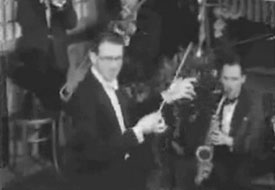 Set oddly enough at a cricket match, The B.B.C. Dance Band Directed by Henry Hall (1932) is one of the "longer" Pathe short-shorts at nearly four & a half minutes.
Set oddly enough at a cricket match, The B.B.C. Dance Band Directed by Henry Hall (1932) is one of the "longer" Pathe short-shorts at nearly four & a half minutes.
The text card following the title reads: "For any Orchestra, all play (Studio) & no play (outside) makes Jack a dull boy -- but our camera caught a really unconvention 'shot' of Henry Hall & the Boys in an off-moment."
It begins with laughter & a game of cricket, with bits of the game & a punning image of Henry Hall holding a quacking duck, which I guess will make true cricket fans laugh. Girlfriends on the sideline laugh at the musicians' awkward play.
The band then strikes up a performance right out there on the cricket field, which we see for about three seconds. The scene then cuts to the studio & we see an actual performance of "Henry Hall & the B.B.C. Boys," which can only be described as instrumentally mediocre.
But then we see vocalist Val Rosing leaning on a column table singing, "Here's to the next time & our merry meeting/ Here's to the next time we send you all our greetings/ Set it to music. Set it to rhyme/ Now all together here's to next time..."
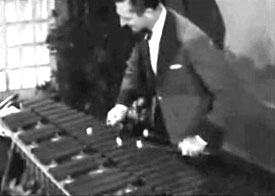 The kindest word I can think of for this song: sucks. Yet Val Rosing (later going by Gilbert Russell) with Henry Hall's BBC Orchestra was once extremely well known to radio listeners & the crummy "dance hall style" is fully formed in this performance. The kindest word I can think of for this song: sucks. Yet Val Rosing (later going by Gilbert Russell) with Henry Hall's BBC Orchestra was once extremely well known to radio listeners & the crummy "dance hall style" is fully formed in this performance.
I hope to hell the millions of listeners of the day, however, knew it was pretty bad filler stuff between good programs. When Val came to America hoping to become an MGM musical star, he went over like a squeeky shoe in the surgical theater.
His greatest claim to fame was a popular recording of "Teddy Bear's Picnic," which made Val even after his name-change "the man who sang Teddy Bear's Picnic" pretty much for the whole of his singing career. He ended his career where he best fit, as a vocal coach to film stars who had to sing in films though having no talent for singing, folks like June Lockhart & Tina Louise.
Also highlighted for a solo is xylophonist Harry Robbins, though frankly the sound is so poor that his playing sounds too clanky to assess.
As the number closes, Henry leans into a square-box microphone sitting on the table where Val had briefly sung, & gives a radio-farewell "until next time" to the audience.
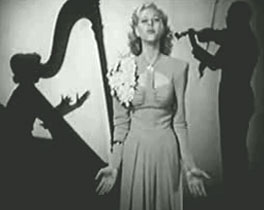 Last Night's Gardenias (1941) is an odd soundie. It opens with Shirley Deane conducting what would appear to be her own orchestra, & wearing an enormous gardenia bouquet on her shoulder.
Last Night's Gardenias (1941) is an odd soundie. It opens with Shirley Deane conducting what would appear to be her own orchestra, & wearing an enormous gardenia bouquet on her shoulder.
Shirley was not a bandleader, however, & that is the Bobby Sherwood Orchestra. Women bandleaders were somewhat rare, & it's intriguing Minoco Productions' creative team just tossed that in as a little fantasy.
Shirley Deane had been a minor comedy star from 1936 to about 1939, a regular as the eldest daughter in the now largely forgotten "Jones family" feature film series starring Spring Byington & Jed Prouty.
By the time she made this soundie for viewing on Panoram jukeboxes, her star was already fading. Just the year before she played Princess Aura in Flash Gordon Conquers the Moon (1940), which lo these many years later is the one role she's still known for by all fans of serials & kitschy old sci-fi. At the time there was no doubt she'd been downgraded from film star to Saturday serial star.
The two soundies she made in 1941 would be her last film work until she made a brief comeback in 1957. So they pretty much mark the end of her career.
The song was by Sam Coslow, introduced in the RKO picture Dreaming Out Loud (1940) where it was sung by Robert Wilcox. It had immediately after become a hit for Bing Crosby, & the soundies right from the start liked to take a current hit song & have it covered by someone they didn't have to pay well to sing it.
Shirley's style for the song is retro & couldn't've appealed to the youth market of the time, a poky swing arrangement that seems especially outdated for boogie-obsessed Panoram jukebox films.
Swinging her orchestral baton as the camera closes in, Shirley tries to face both the band & the camera as the orchestra plays on, & has sufficient acting chops to not look too silly twisting forward & backward for the band then the camera.
She then scuttles past the piano which is playing an opening introduction to the lyrics. Shirley begins with a rather squally high pitch:
"Last night's gardenias have wilted & lost their bloom/ But somehow the same perfume/ Is lingering in my room..." Could be that big honking corsage on your shoulder!
There are some nice silhouettes for musicians' solos projected on a backscreen, plus a little romantic interlude is acted out by a silhouetted couple. Then the camera returns to Shirley for her yawn-inducing close.
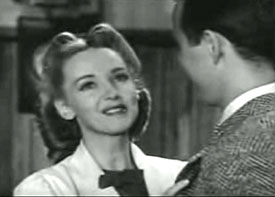 Lucille Bremer in her Saturday night date duds is half on & half off a hammock looking a bit awkward. Lucille Bremer in her Saturday night date duds is half on & half off a hammock looking a bit awkward.
She immediately begins a swing tune: "Every time I sing a lively tune/ I recall a certain night in June/ When I strolled into a noisy place/ And love & I met face to face."
So begins Penny Arcade (1942), a workmanlike but pleasant enough soundie, with Lucille's equally pleasant nondescript voice.
The musical arrangement is from Frank Denning & His Orchestra, not seen in the soundie, as they wouldn't've been present the day Lucille mimed or lipsynched her performance.
When the scene shifts to a staged penny arcade, she bursts into the main body of the song, her beau (Peter Garey) on her arm: "At the penny arcade/ That's where I once strayed," & both tune & lyrics get rather worse as it goes along.
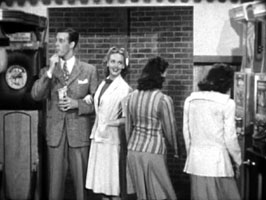 Lucille was something of a soundies discovery. Her standard biography makes her Arthur Freed's discovery when he saw her specialty dance act in a niteclub, & gave her a sizeable support role in Meet Me in Saint Louis (1944). But that was a couple years after she'd made her three soundies. Lucille was something of a soundies discovery. Her standard biography makes her Arthur Freed's discovery when he saw her specialty dance act in a niteclub, & gave her a sizeable support role in Meet Me in Saint Louis (1944). But that was a couple years after she'd made her three soundies.
MGM's attempt to groom her for bigger stardom never took root & after about four years in the general pool of MGM dancers/singers/actors, she found love & retired from the life of the movie lot in favor of marriage.
In the penny arcade, Shirley's beau eats crackerjacks & grins at her as she sings. They stroll about the stage playing with the penny-apiece devices, which are few in number but more interesting than the song.
At the instrumental break, which sounds like there's a cat inside an accordion getting squeezed, our happy dating couple gaze into three old peep-show mutoscopes.
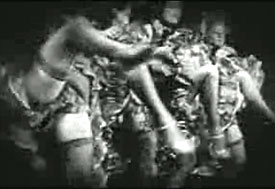 They watch a fragment of a Fatty Arbuckle & Mabel Normand silent comedy in the first mutoscope; a can-can performance in the second; & a Billy Franey silent film fragment in the third. By then the instrumental ends & Lucille wraps up the number. They watch a fragment of a Fatty Arbuckle & Mabel Normand silent comedy in the first mutoscope; a can-can performance in the second; & a Billy Franey silent film fragment in the third. By then the instrumental ends & Lucille wraps up the number.
The use of public domain silent film footage was merely a trick to save money on the already cheaply produced soundie. The second mutoscope though recycles its footage from another soundie rather than from an old silent.
The can-can fragment glimpsed in Penny Arcade was borrowed from The French Canadian Can-Can (1941). This starred Fifi D'Orsay backed up by George Steiner & His Orchestra.
Fifi sings while sitting on a piano in a cafe, showing lots of leg. A short line of chorus girls performs the can-can. Fifi's had been a flapper star in the early 1930s & made a number of films, notablyk the musical The Girl from Calgary (1932), though in most of her films she played the naughty Parisian girl rather than Quebecoise.
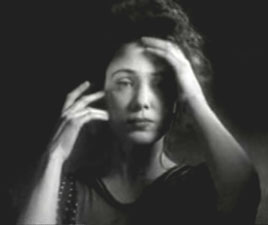 Margaret Mary O'Hara, who voiced Sally in The Nightmare Before Christmas (1993), is accompanied on Body's in Trouble (1988) by brilliant guitarist, drummer, & violinist as she sings in her broken, spasmodic, heartbreakingly beautiful manner.
Margaret Mary O'Hara, who voiced Sally in The Nightmare Before Christmas (1993), is accompanied on Body's in Trouble (1988) by brilliant guitarist, drummer, & violinist as she sings in her broken, spasmodic, heartbreakingly beautiful manner.
She is one of the few female singers I would compare to Tom Waits in absolute stunning brilliance. Not that she's got gravel in her vocal cords (that'd be Marianne Faithful) but she's in the same alternate world of more-talented-than-god-intended sacred oddity.
Her lyrics are strange, beautiful poems, sung as though by a drunk on the verge of falling over unconscious:
"You just want to move somebody/ The body won't let you/ Want to, want to feel somebody/ Body won't let you/ Just want to ride somebody/ The body won't let you oh hoo-ah uh hoo-uh/ Who do you talk who do you talk who do you talk to oh ah/ Who do you talk to who/ When your body's in trouble..."
These are mysterious, disturbing, erotic lyrics that could mean many things to many people. It has, however, become something of an anthem for people with multiple sclerosis.
The black & white film doesn't quite strobe-light its subjects, but lighting comes and goes from sharp & clear to silhouetted shadows, a beautiful little film to match an incredible song.
This wonderful video promoted O'Hara's only full length album to date, the absolute masterpiece Miss America (1988), and shocking she hasn't done several albums since.
copyright © by Paghat the Ratgirl
|



 The kindest word I can think of for this song: sucks. Yet Val Rosing (later going by Gilbert Russell) with Henry Hall's BBC Orchestra was once extremely well known to radio listeners & the crummy "dance hall style" is fully formed in this performance.
The kindest word I can think of for this song: sucks. Yet Val Rosing (later going by Gilbert Russell) with Henry Hall's BBC Orchestra was once extremely well known to radio listeners & the crummy "dance hall style" is fully formed in this performance.

 Lucille was something of a soundies discovery. Her standard biography makes her Arthur Freed's discovery when he saw her specialty dance act in a niteclub, & gave her a sizeable support role in Meet Me in Saint Louis (1944). But that was a couple years after she'd made her three soundies.
Lucille was something of a soundies discovery. Her standard biography makes her Arthur Freed's discovery when he saw her specialty dance act in a niteclub, & gave her a sizeable support role in Meet Me in Saint Louis (1944). But that was a couple years after she'd made her three soundies. They watch a fragment of a Fatty Arbuckle & Mabel Normand silent comedy in the first mutoscope; a can-can performance in the second; & a Billy Franey silent film fragment in the third. By then the instrumental ends & Lucille wraps up the number.
They watch a fragment of a Fatty Arbuckle & Mabel Normand silent comedy in the first mutoscope; a can-can performance in the second; & a Billy Franey silent film fragment in the third. By then the instrumental ends & Lucille wraps up the number.